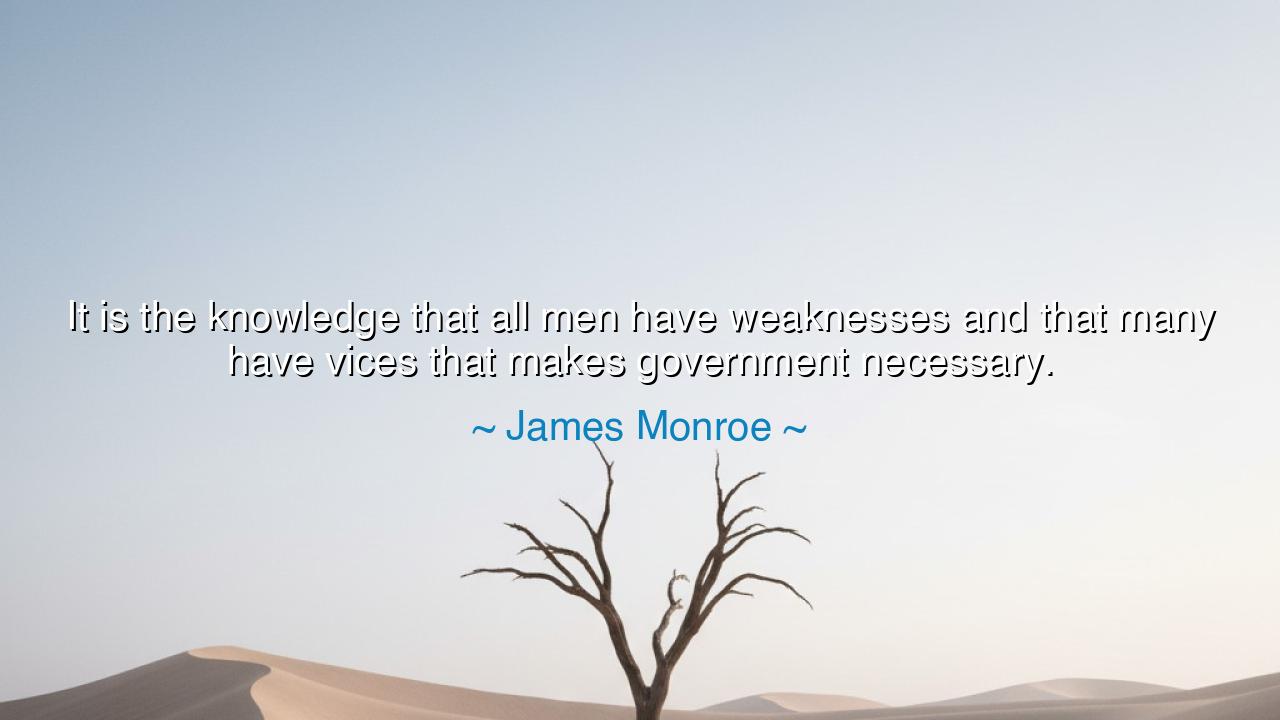
It is the knowledge that all men have weaknesses and that many
It is the knowledge that all men have weaknesses and that many have vices that makes government necessary.






The words of James Monroe, fifth President of the United States and guardian of a young republic, strike with solemn truth and enduring wisdom: “It is the knowledge that all men have weaknesses and that many have vices that makes government necessary.” In this declaration, Monroe did not condemn mankind, nor did he exalt authority; he merely revealed the eternal tension between human imperfection and the need for order. His words echo across the centuries as both warning and revelation—that government is not born from the virtue of men, but from their frailty, and that the art of ruling is, in essence, the art of restraining the darker impulses that dwell within every human heart.
At its heart, this quote speaks to the dual nature of humanity. For though man is capable of reason, compassion, and nobility, he is also driven by ambition, greed, envy, and pride. The same mind that builds cities can also destroy them; the same hand that writes laws can also break them. Monroe’s insight recognizes that because men are not angels, no society can endure without structure, restraint, and the rule of law. Government, in his view, is not an imposition upon liberty—it is its protector, the shield that guards civilization from descending into chaos. To deny this truth is to forget that the greatest threats to peace have never come from nature, but from the ungoverned passions of man.
The origin of these words lies in the intellectual soil of the Enlightenment and the Founding Era of the United States. Monroe, a disciple of James Madison and a comrade of Thomas Jefferson, was shaped by the philosophy that had birthed the American Constitution—the belief that men, being imperfect, must never be trusted with unchecked power. The founders knew that liberty could not survive without restraint, and that justice could not flourish without law. Monroe’s statement, therefore, was not born of cynicism but of realism—a recognition that good governance must be built not upon faith in human goodness, but upon guardrails against human corruption. This same wisdom inspired the creation of checks and balances, the separation of powers, and the constitutional limits that preserve freedom by restraining vice.
History itself testifies to the truth of Monroe’s words. In the final days of the Roman Republic, when ambition devoured virtue, the Senate fell and the Caesars rose. Brutus and Cassius, once defenders of liberty, succumbed to pride and vengeance; Caesar himself, driven by glory, shattered the old order. There was no law strong enough to hold back human hunger for domination, and thus Rome became a dictatorship draped in the corpse of its republic. Likewise, in later centuries, revolutions that began in the name of freedom often perished in tyranny—proof that without the discipline of law, liberty consumes itself. Monroe, a student of these histories, saw in them a warning for every age: that to believe in the perfectibility of man is to invite ruin, but to govern with humility toward man’s weakness is to preserve peace.
Yet Monroe’s wisdom is not meant only for kings and legislators. It speaks to the governance of the individual soul. For just as nations require laws to restrain their passions, so too does every human being require discipline to master their desires. The one who rules himself justly needs little rule from others, but the one who abandons self-control will always be ruled—by impulse, by addiction, by the tyranny of emotion. Thus, the lesson of this quote extends beyond the halls of government to the inner kingdom of the heart: that freedom is not the absence of limits, but the triumph of virtue over weakness.
In this light, Monroe’s message becomes both moral and spiritual. He reminds us that government exists not because man is evil, but because man is human—fallible, tempted, yet capable of redemption. The task of good governance, whether in a nation or within oneself, is to acknowledge imperfection without surrendering to it, to create systems that guide rather than crush, and to balance mercy with justice. A people who forget this truth will demand either anarchy or tyranny—freedom without order or order without freedom—and both paths end in ruin.
The lesson, then, is eternal: wisdom begins with humility. The wise ruler governs knowing that he, too, is flawed. The wise citizen obeys laws not out of fear, but out of reverence for the fragile balance that sustains peace. And the wise soul, looking inward, learns to govern his own passions before judging the failings of others. If we remember, as Monroe did, that weakness is the reason for both governance and grace, we may yet build a world where power serves justice, and justice serves mankind.
So let his words stand as a torch for every generation: Government is necessary not because men are fallen beyond hope, but because they are redeemable only through structure and conscience. Guard the laws, therefore, as you would guard your soul; restrain the corrupting power of ego as you would restrain a tyrant; and remember always that the noblest government begins not in the palace or the congress, but in the self-governed heart of man.






AAdministratorAdministrator
Welcome, honored guests. Please leave a comment, we will respond soon